We are developing the social individualist meta-context for the future. From the very serious to the extremely frivolous... lets see what is on the mind of the Samizdata people.
Samizdata, derived from Samizdat /n. - a system of clandestine publication of banned literature in the USSR [Russ.,= self-publishing house]
|
A story in The Telegraph has brought to mind the following quotation, which seems doubly apt:
“Hegel remarks somewhere that all great world-historic facts and personages appear, so to speak, twice. He forgot to add: the first time as tragedy, the second time as farce.”
– Karl Marx, writing in “The Eighteenth Brumaire of Louis Napoleon”
Here is an excellent piece from The Libertarian about how to think about what is going on with Russia, Ukraine, etc, and the response to it of various people, including those who fall into the trap of “my enemy’s enemy is my friend” fallacy. Other fallacies are addressed such as “who are we to judge X?” and “it’s just not our business” positions.
Via Tim Worstall, this:
Donestk was founded in the 19th century by John Hughes, a Merthyr Tydfil steel worker who had landed a contract from the Tsarist government to provide steel plating for the navy.
Now residents of the city have responded to pro-Russian protests for autonomy from Kiev with an internet vote that rejects Russia’s claims in favour of a turn to the Queen and London.
It calls for the restoration of the original name Hughesovka or Yuzovka and requests London rule.
After the Bolshevik revolution, the city was renamed Stalino and finally called Donetsk in 1961.
A total of 7,000 people had voted by Sunday with 61 per cent voting to secede to Britain and a further 16 per cent voting to make the city an English-speaking autonomous region inside Ukraine.
“We demand a referendum on the return to Yuzovka to its original bosom – a part of Great Britain,” the preamble declared. “Glory to John Hughes and his town. God Save the Queen.”
I read in Colin Thomas’s book on Hughesovka / Stalino / Donetsk, Dreaming a City, that the name “Stalino” preceded the era when everything was named after Stalin, and initially was intended to identify the town with its main industry, steel.
“Natural gas was the origin of the crisis in Ukraine. It is in Russia’s interest to keep Ukraine and Europe hooked on Russian gas at prices just low enough to quash incentives to drill and frack for shale gas. Russia’s state-run news and propaganda outlets have for years disseminated articles critical of fracking and supported opponents of the technique. Now with Yanukovich gone it’s as if Putin has taken the Crimea as a kind of hostage — collateral to hold against what Ukraine owes Russia for gas. The desperation of Putin’s actions underscore the threat that shale gas development really does pose to Russia’s gas-fueled diplomacy.”
Christopher Helman, Forbes.
A new book, called The Frackers, has come out on the issue of the shale-gas engineers and how they have succeeded despite, and not because of, state involvement. Al Gore or whoever might try and lay claim to have invented the internet but they certainly cannot do so with fracking. About the best that can be said of the role of government is that it sometimes upholds property rights necessary for said activity to go ahead.
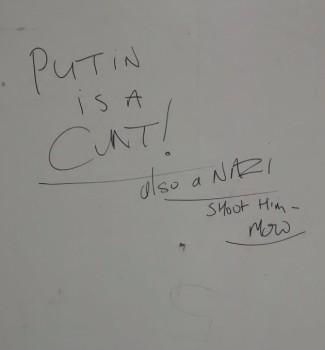
I saw this in a very affluent part of London, scrawled on the hoarding of a building site. One of the people working there saw me taking this picture and laughed.
Me: “I wonder who wrote that?”
Builder bloke, foreign accent: “Many guys here are Polish.”
Me: “One of them wrote this?”
Builder bloke, shrugging: “I guess.”
Me: “Is this because of what is happening in Ukraine?”
Builder bloke: “Yeah, Ukraine. And because it’s true. People forget, then something like this makes you remember what it is to live close to Russia. My son is in Army. Shit like this is why.”
Me: “Polish army?”
Builder bloke: “Latvian army.”
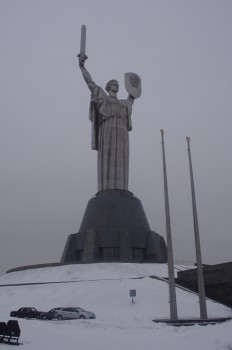 Kiev, Ukraine. January 2013. Kiev, Ukraine. January 2013.
This rather extraordinarily monumental statue stands on top of (and forms part of) the Museum of the Great Patriotic War in Kiev, Ukraine. The monument is officially named “The Mother of the Fatherland” but (perhaps curiously) is more commonly referred to as “The Mother of the Motherland”, and (perhaps less curiously) is sometimes referred to colloquially as “Tin Tits”. The museum commemorates the Soviet victory of the Nazis in World War 2. Although people in most countries of the USSR have rather ambiguous (at best) feelings about their Soviet past, the victory over the Nazis is quite reasonably seen as a good thing, and memorials to the war are still generally looked after and treated with respect. The statue itself is 62 metres tall. Including the base and building it stands on, the statue is over 100 metres above the ground, making it one of the largest statues in the world.
The statue sits upon a high hill overlooking the Dnieper River from its right bank, towards Kiev’s endless Soviet era suburbs on the other side of the river.
Enormous as this statue is, it is actually less grandiose than an earlier proposal. In the 1950s, there were proposals to built twin statues of Lenin and Stalin side by side, each approximately 200 metres tall – each significantly higher than the Washington Monument. Thinking about this in the past, I have thought that these statues would have been unspeakable abominations, and that the Ukrainian people were extraordinarily lucky to merely have the current, modest structure instead of this.
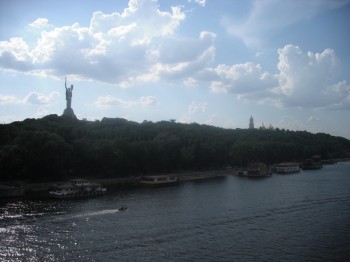 Kiev, Ukraine. June 2009. Kiev, Ukraine. June 2009.
This evening, though, I am not so sure. Well, not entirely. Sure, they still would have been unspeakable abominations, but what a fine day today could have been had they been there. Imagine these gigantic statues of these evil men being pulled down, and the immense splash that they would have made as they fell from the top of the hill into the Dnieper, causing tsunami all the way to Dnipropetrovsk.
That would have been awesome.
The year being 1913, of course.
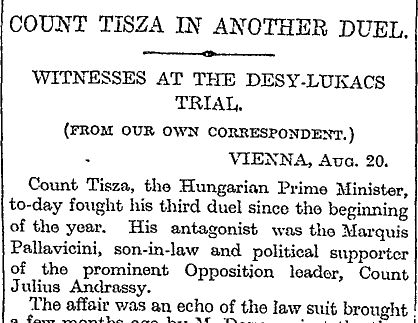 The Times, 21 August 1913 p4
The whole business seems to be a bit stylised although still dangerous.
I do not claim to be an expert on the Balkan Wars which were fought in 1912 and 1913. If I understand correctly, in the First Balkan War Turkey was almost completely thrown out of Europe while in the second Bulgaria embarked upon a war of conquest and ended up with rather less than she’d started with.
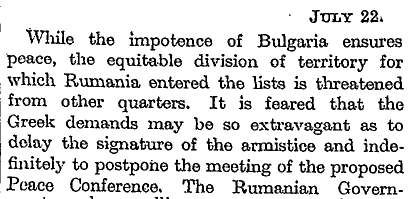 The Times 23 July 1913 p8 The significance of all this, as Eric Sass points out, lay in how it altered Russia’s relationship with Serbia. Russia, Serbia and Bulgaria were Slavic states. Russia, being the biggest, wanted to be the leader. Serbia and Bulgaria, being small wanted Russian protection. So, when a dispute rose over the borders between them the two small states submitted their dispute to the big one. When Bulgaria failed to get what she wanted she went to war.
Defeat led to Bulgaria allying herself with Austria-Hungary while Russia responded by allying herself ever more closely with Serbia. Hence, perhaps, the robustness of Russia’s response to Austria’s declaration of war against Serbia in 1914.
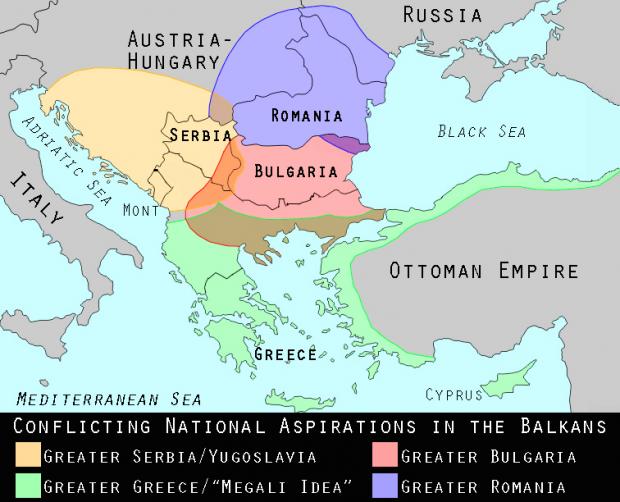
Update For a while now I’ve been in the habit of linking to the whole page rather than just the article. This has been to give readers the chance to see what else was making the news at the time and, perhaps, to find something just as bloggable. Well, it appears Simon Gibbs has done just that.

There is, in this world, something called the Budweiser trademark dispute. The giant American brewery Anheuser-Busch produces a beer named Budweiser, an industrial mass produced lager that is not greatly revered by beer connoisseurs but which sells in large quantities, and a brewery called Budweiser Budvar Brewery in the Czech city of České Budějovice (Budweis in German) produces another beer called Budweiser, which is considered an excellent beer by most beer lovers. The two breweries have been fighting in courts throughout the world with respect who has the right to the name Budweiser ever since the end of Communism in Czechoslovakia. In some countries the Americans have won and the Czechs have had to find a different name, and in others the Czechs have won and the Americans have had to find a different name. In Britain the courts have made the eminently sensible ruling that both brewers can use the name and drinkers are smart enough to be able to tell the difference, but I don’t believe this has happened anywhere else.
Beer lovers are often sympathetic to the claims of Budvar, because the beer is better and because it actually come from Budweis, and this is therefore the “Original Budweiser”.
This is not really true, however. Anheuser-Busch started brewing the American Budweiser in 1876, due to the fact that the beers of Budweis were famous, including amongst German Americans. However, the Budvar brewery did not exist at that point. This brewery was not founded until 1895. At some point after that, they also started using the name Budweiser, possibly because the name had been given further fame by Anheuser-Busch. At least to some extent, the Czechs at Budvar may have started using the name because of the use of it by Anheuser-Busch, and not the other way round. Budvar was founded by ethnic Czechs, and the only reason they would have had for using a German name was that the German name had already been made famous by other brewers.
However, what of those earlier beers from Budweis, responsible for Anheuser-Busch starting to use the name? Well, there is another, much older, brewery in Budweis / Budějovický Budvar. This brewery, known as Budweiser Bürgerbräu until 1945, made beer in Budweis under the Budweiser name at least as early as 1802. It is almost certainly this company’s beers that Anheuser-Busch was copying when they started using the name “Budweiser”. This brewery was run by ethnic Germans from its founding until 1945, after which it was taken over by ethnic Czechs and de-germanised. The brewery is now called Budějovický měšťanský pivovar, which is a precise Czech translation of its original name. When de-germanisation took place, the brewery ceased using German words and names, including “Budweiser” (it regained some interest in using them post-1989). However, this brewery has by far the strongest claim that it produces the beer that is the original Budweiser.
That said, the trademark battles between the other two, larger companies have been so ferocious that Budějovický měšťanský pivovar has stayed clear of them, despite apparently having a stronger claim to the name than either of them. The brewery is quite a substantial one, and produces a significant quantity of (excellent) beer. It sells the beer under a variety of names including Crystal, Samson, B.B. Bürgerbräu, Boheme 1795, and more. It only uses the word “Budweiser” in places where trademark law is weak.
This is why I took the above photo, in Tbilisi in Georgia last month. It was certainly not the first time I had consumed beer from the brewery that actually gave us Budweiser, but it was the first time I had ever seen beers from that brewery actually using the word. It is not the most prominent word on the label, perhaps, but it is still prominently there.
Bernard Levin wrote this about a deceased leader much-lauded by progressives when certain domestic grievances became public after the icon’s death:
Tito’s widow has been claiming (unsuccessfully) her inheritance; he had got rid of her a few years before his death, no doubt to instal something more agreeable and up-to-date in her place, and they clearly parted very non-speaks indeed – so much so that she seems to have lived under conditions not far removed from house arrest ever since.
The marital relations of Tito do not concern me; what caused me to twitch an eyebrow when I read of the dispute over his property was the list of said property. It included cars, motorboats, horses, yachts, jewellery, paintings, a score of villas, orchards, a safari park and vineyards; and the value amounted to millions of pounds.
You see the point immediately, no doubt. What was this noble, selfless, upright, honourable, caring, moral, austere, heroic, truly socialist figure – the Stafford Cripps of the Balkans, the Keir Hardie of the non-aligned, the Nye Bevan of small nations – what was he doing with millions of pounds’ worth of luxury goods, disappointed widow or no disappointed widow?
[…]
Nor … is the corruption of power limited to one end of the political spectrum. It is true that supporters of left-wing regimes, and of left-wing insurgents against right-wing regimes, invariably claim that the defeated or beleaguered forces of the right are financially corrupt, and those making the claims proudly contrast their own side’s scrupulous purity in money matters, to such an extent that it sometimes seems as though Marxism is not an ideology but an antibiotic, with the miraculous property of cleansing the patient’s blood of avarice, dishonesty and a taste for grands crus and caviar.
But apart from the fact that it almost always turns out, even if only after some years, that the Marxist power-brokers were not in the least averse to sleeping off feather beds, dining off gold plate and exercising every variety of droit de seigneur, there is no evidence at all that a belief in communism, even if it is genuine rather than cynically professed, is in any way a guarantee of financial probity and moral uprightness.
[…]
As it happens, I knew that Tito was a crook as long ago as 1977, when on a state visit to France, he stopped at Michel Guérard’s place at Eugénie-les-Bains (to judge by that waistline, I bet he didn’t go for the cuisine minceur) and skedaddled without paying the bill.
[…]
I remember thinking at the time that Tito had been so accustomed to bilking restaurateurs and shopkeepers in his his own country without being challenged (because none, back home, would dare to challenge him) that he had altogether forgotten that elsewhere a bit of give is expected to accompany the take.
– Bernard Levin, from an article originally published in the Times on January 24th, 1986, and reprinted in his collection In These Times.
I have never heard that the late Commandante Hugo Chávez went so far as to put his troublesome ex under house arrest, but he has certainly had wife trouble. Marisabel Rodriguez, his second wife, claims that he made use of his official position to bully her. Not just wife trouble, woman trouble generally. Like Tito, Chávez was something of a Don Juan. His longest lasting paramour, Herma Marksman, told the Sunday Times in 2006 (subscription required to see full article) that he was a romantic lover but was “imposing a fascist dictatorship”. The similarities between Tito and the now presumably re-reincarnated reincarnation of Bolivar do not end there. Chavez seems to have done well for himself. I would prefer to have more than one source before endorsing the oft-quoted estimate of his personal fortune at a billion dollars made by Criminal Justice International Associates (CJIA), but An Argentinian journalist, Olga Wornat, can be heard here being interviewed by ABC News in 2007 and she does provide sources to suggest he liked the high life. Wornat wrote a book about several Latin American leaders called “Accursed Chronicles”, for which she interviewed Chávez himself and many of those close to him including cabinet members, his two ex-wives, his long time lover Herma Marksman mentioned above, his tailor and his psychiatrist. She says that he had collections of luxury watches and Italian suits, spent $65 million on a private Airbus (with a $500,000 bill to repaint the flag on the jet so it would look the way it did when he used to draw it in school) and that his family, despite the turbulent relations between him and them, were the “richest in Venezuela” and were the “royal family” of their home state. His daughter Rosines flashing wads of dollars on Instagram caused widespread irritation among less well-connected Venezuelans, who face severe restrictions when trying to obtain dollars.
Comnandante Chavez had the waistline to match Marshall Tito’s. Did he feel obliged to pay his restaurant bills? I did not find any specific claim that he did not, but it would be a brave restaurant owner who presented El Presidente with a bill when said Presidente had displayed such a penchant for expropriations, often done openly on his personal whim and in revenge for trivial thwarting of his desires; who, for example, seized the Hilton resort on Margarita Island in with the words,
“To hold the conference we had to ask for permission… and the owners tried to impose conditions on the revolutionary government. No way,” AFP quotes Chávez as saying. “So I said, ‘Let’s expropriate it.’ And now it’s been expropriated.”
Chávez is one up on Tito; Josip stole the meal, Hugo stole the whole building. In response, let it be noted, to the rightful owners having had the gall to expect that their permission was required before the revolutionary government could use their building.
So, when’s the reading of the will?
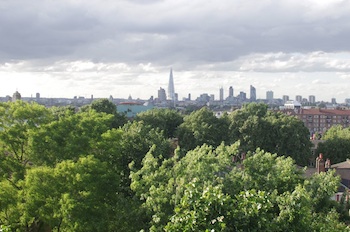 London, England. (Photographed from a rooftop in Peckham) . 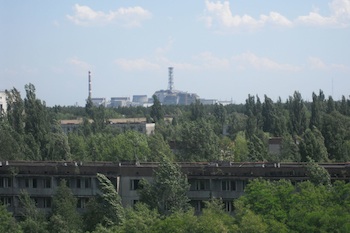
Chernobyl, Ukraine. (Photographed from a rooftop in Pripyat).
Every so often, when I hear people tell me that the Cold War is a long-lost issue and that we need to “move on”, to use that cant expression, I remember that there are, unbelievably, people out there who still think that the Soviet Union and its empire was a benevolent force and no worse than that of the NATO alliance that successfully helped to bring it down, and who therefore regard people who helped thwart the Soviet regime, like Vaclav Havel, as bad men. Case in point is this creature by the name of Neil Clark, writing in the Guardian newspaper:
“No one questions that Havel, who went to prison twice, was a brave man who had the courage to stand up for his views. Yet the question which needs to be asked is whether his political campaigning made his country, and the world, a better place. Havel’s anti-communist critique contained little if any acknowledgement of the positive achievements of the regimes of eastern Europe in the fields of employment, welfare provision, education and women’s rights. Or the fact that communism, for all its faults, was still a system which put the economic needs of the majority first.”
Absolutely. Presumably, that explains why there were millions of downtrodden, poor people attempting to enter the Soviet Empire from such hellholes as West Germany. That explains why East Berlin erected the Wall, to contain the flood of people trying to enter it. Yes, that must have been the reason. (Sarcasm alert).
I guess the fact that the Soviet System created a two-tier society: the Party and Everyone Else, must have escaped Mr Clark’s gimlet-eye attention. Perhaps the Gulag, the shootings of political opponents, the construction of the White Sea Canal (with slave labour), etc, were in fact all features of ensuring that the “needs of the majority” came “first”.
For what it is worth, on a more theoretical level, the horrors of collectivism can be summed up in Marx’s dictum: “From each according to his ability, to each according to his needs”. For if you believe that the needs of the majority trump such pesky issues as rights or liberties, then so much the worse for such liberal principles. But in practice, of course, the history of the Communist world was littered with stories of shortages, famines and shabby, crappily produced goods and services.
I had actually forgotten about Neil Clark’s existence. Alas, his ghastly prose now comes back to haunt me. I remember reading about this character about five or six years ago, when writers such as Oliver Kamm and Stephen Pollard tore this man’s sophistries to pieces.
Thanks to Michael Blackburn for the pointer. Christina Odone also rubbishes Clark.
And here is a useful roundup of links for deniers of socialist brutality. Clark makes the list, unsurprisingly.
|
Who Are We? The Samizdata people are a bunch of sinister and heavily armed globalist illuminati who seek to infect the entire world with the values of personal liberty and several property. Amongst our many crimes is a sense of humour and the intermittent use of British spelling.
We are also a varied group made up of social individualists, classical liberals, whigs, libertarians, extropians, futurists, ‘Porcupines’, Karl Popper fetishists, recovering neo-conservatives, crazed Ayn Rand worshipers, over-caffeinated Virginia Postrel devotees, witty Frédéric Bastiat wannabes, cypherpunks, minarchists, kritarchists and wild-eyed anarcho-capitalists from Britain, North America, Australia and Europe.
|












